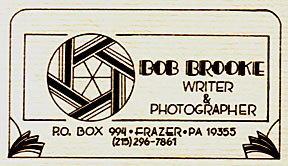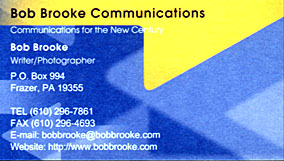Bluffing isn’t only for poker players. As a freelance writer, you may find that every once in a while it will come in handy—but be prepared to fast-talk yourself out of a jam should you get caught. Generally speaking, bluffing is making someone think one thing when another or even the opposite is true.
As you start out in your writing career, you don’t have much going for you. You most likely haven’t published much or perhaps nothing at all. And trying to get something published seems to be an uphill battle. It’s a bit like trying to get a loan from your bank without any credit. And while you can’t bluff your way out of not having credit, you can stretch the truth somewhat about publishing.
For instance, let’s say you’ve had an opinion piece published in your local paper—if it still exists. You can list this accomplishment when querying an editor, just don’t say the piece was for the Op-Ed Page. Instead say you had an article published in such and such a paper. It will be difficult for an editor to track it down. But the credit still looks good and isn’t a lie. If you can get short pieces of 300 words or so published in print or on the Internet, that will help to bolster your professional image, especially if the idea you’re pitching is a really good one. What you’ve published and where you’ve published it won’t matter much.
The second bluff you can easily do is to make yourself look successful. Just as dressing for success can make a business career, so dressing your work can help start your writing career. Too many beginning writers think it’s just about the writing. There’s a lot more to it than that.
Start by designing a professional letterhead and perhaps even a simple, but professional looking Web page. Although you’ll most likely be conducting most of your correspondence electronically, you should make a good impression, nonetheless. Beyond correspondence, design your own invoice or get a free pre-formatted one from the Internet. Nothing says you’re professional more than a businesslike invoice.
Along with the above, its imperative to format your writing correctly. The writing biz has standards, and you should learn and follow them. Even if your writing isn’t that great, editors will more likely read it if it’s a good idea formatted as professionally as possible.
A third bluff that may come in handy sometime in your career, but especially in the beginning, is obtaining an interview from a prominent person or celebrity when you’re not writing for the top markets. In this case, it’s important to be honest with the person or their publicist. Don’t lie, but, on the other hand, don’t’ tell them everything.
For example, find out as much about the person as possible. Flattery will get you everywhere in this case. Make an appointment and have your questions prepared ahead of time. In fact, it’s a good idea to send them to the person or publicist in advance of the interview. As in the case above where you list credits that lead someone to believe they’re more than they are, you’ll need to do the same. Or you can bluff your way into seeing the person.
When George P. Chapman of the Westerly Rhode Island Sun wanted to get an exclusive from Albert Einstein, he pulled a trick that got him past the impatient crew of big-time reporters waiting outside, straight into the genius's living room.
Though he was a reporter, he was also a telephone repairman. Wearing his lineman's boots and work clothes, carrying his tools, Chapman strolled casually to the door of Einstein's summer cottage. "I've come to look over your phone," he said.
The maid let him in, saying, "Good. The professor has been trying to get Washington, and the dial is slow." Chapman produced a can of oil and fixed the recalcitrant machine. Then he turned to Einstein and announced he was a reporter for the local paper. Could he have a statement? He got his scoop with a smile.
Bluffing has its place in freelance, but remember not to overdo it. Once you’ve established yourself, use your own knowledge and credits to build your career.
Showing posts with label letterhead. Show all posts
Showing posts with label letterhead. Show all posts
Saturday, July 7, 2012
Bluffing It
Saturday, March 17, 2012
Keeping Your Supply Closet Stocked
 A whole lot has changed for me as a freelance writer in the past two decades, at least as far as keeping my supply closet stocked. It used to be that when I needed office supplies, my only option was a mom and pop office supply store that sold most of their items at relatively high prices. Today, that’s all changed.
A whole lot has changed for me as a freelance writer in the past two decades, at least as far as keeping my supply closet stocked. It used to be that when I needed office supplies, my only option was a mom and pop office supply store that sold most of their items at relatively high prices. Today, that’s all changed.When I first started freelancing in the mid-1980s, I did all of my work on a typewriter. Then I had to worry about keeping fresh ribbons and whiteout handy, along with standard copy paper. In those days, I didn’t have print cartridges to deal with or other accessories of the Computer Age.
Besides the standard office supplies—paper clips, rubber bands, stapler, labels, postage stamps, pens, pencils, calculators, index cards, and file folders—the Computer Age has its own set of office supplies—printing paper, printer cartridges, software, CDs, DVDs, thumb drives, etc. So how do I keep all of these items in supply without going over my budget? The answer is easy, diversify.
The most important supplies, at least at the beginning, was my letterhead and related stationery with my logo or business address on it. Add to this my invoices—I can’t get paid without them. All of these items carry my business image to the larger business community, so it was imperative that they look professional. I designed my first letterhead and business cards myself using a scissors and glue to cut and paste the designs. I had to take these to a local printer who charged me dearly for them. In fact, in those days I also had to go to his place to make copies.
 Today, I design, produce, and print my letterhead and stationery, as I need it, using my computer and printer. I get spiffy business cards at a substantial discount from VistaPrint.com. I can get 250 of them for free, plus the cost of shipping, as long as I use one of their designs. I get compliments about them all the time. To make sure everything goes together, I design my letterhead to go with the existing template cards. I can also get the cards custom-made by VistaPrint for a bit more.
Today, I design, produce, and print my letterhead and stationery, as I need it, using my computer and printer. I get spiffy business cards at a substantial discount from VistaPrint.com. I can get 250 of them for free, plus the cost of shipping, as long as I use one of their designs. I get compliments about them all the time. To make sure everything goes together, I design my letterhead to go with the existing template cards. I can also get the cards custom-made by VistaPrint for a bit more. I do the same for my invoices. Originally, I purchased a pad of blank ones at the stationery store. Then I designed my own when I began sending them all by E-mail. I create my invoice in my word processor, then copy and paste it below my signature in the E-mail message. I add a note within the invoice for the person receiving it to print it and send it along to their accounts receivable department.
When I began freelancing, it was important to have a business phone and be listed in the Yellow Pages. Do they even have them anymore? (I jest.) Today, my regular phone works just fine, but along with it I have my Internet connection, which just got boosted to “super zippy” speed through Verizon FIOS. Add to these connections to the outside world is my cell phone. No, not the pay-by-the-month, all-inclusive plan, but just the plain pre-pay variety through Tracfone. I find this more than adequately fulfills my needs.
So what about the rest of my office supplies? Sure, I can opt to go to Staples, Office Max, or Office Depot to buy what I need, but I find that at those places, I have to buy in larger quantities. I learned as the years went by that I don’t need 10,000 paper clips, a 1,000 rubber bands, and a box of 10 reams of paper. The little money I might save buying in such quantities is offset by my not using very many of them at one time. I also keep my eye pealed for sales on these items from local drug and discount stores, especially in August and September before the start of school.
The item that costs the most is print cartridges. Instead of paying nearly $30 for one cartridge, I buy refurbished ones for my HP printer from LDProducts.com. I can buy three cartridges from them for what I have to pay for one at Staples. Before LDProducts, I purchased cartridges from a similar company that I discovered at a local computer show. If I’m in a pinch, I can always take an empty HP cartridge to Walgreens to have it refilled for a few dollars more than the price of one from LD. For this reason, I make sure I have an extra HP cartridge or two lying around my office.
If I do want to purchase office supplies in bulk, there are plenty of places online that offer larger amounts at reasonable prices, often with free shipping for orders of $50 or more.
Postage used to take up a large chunk of my budget. Today, I do just about all my correspondence by E-mail, including sending complete book manuscripts to my publishers. So now I buy a book of 20 stamps at a time, enough to last me for a month or two. Soon I may be paying most of my bills online, saving me even more on postage. When I do purchase postage of any kind, I always ask for a receipt.
When I’m traveling for research or on assignment, I carry some basic supplies with me. I use a larger ZipLoc bag to hold a few sheets of printed letterhead and envelopes, some business cards, stamps, 3x5 cards, paper clips, rubber bands, a couple of extra ballpoint pens (black, red, and blue), a small block of StickyNotes, a roll of Magic tape, a small pair of scissors, and a miniature stapler. I also stick a few empty manila file folders into my computer bag. I used to have to carry tapes and batteries for my tape recorder, but today now I use a digital recorder which requires neither.
Labels:
business cards,
cartridge,
freelance,
invoice,
letterhead,
office,
Office Depot,
Office Max,
paper,
postage,
printer,
Staples,
supplies,
USPS,
VistaPrint,
writing
Subscribe to:
Posts (Atom)


